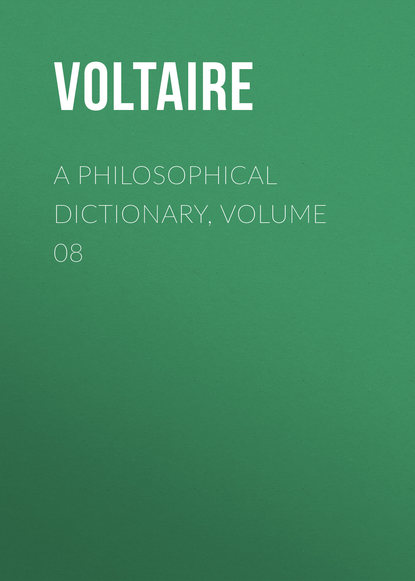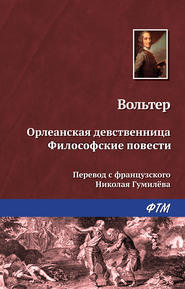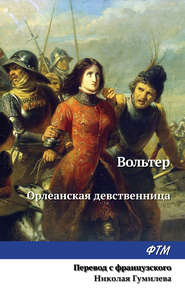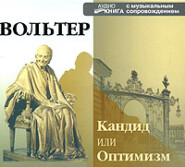По всем вопросам обращайтесь на: info@litportal.ru
(©) 2003-2024.
✖
A Philosophical Dictionary, Volume 08
Настройки чтения
Размер шрифта
Высота строк
Поля
The plurality of gods is the great reproach at present cast upon the Greeks and Romans: but let any man show me, if he can, a single fact in the whole of their histories, or a single word in the whole of their books, from which it may be fairly inferred that they believed in many supreme gods; and if neither that fact nor word can be found, if, on the contrary, all antiquity is full of monuments and records which attest one sovereign God, superior to all other gods, let us candidly admit that we have judged the ancients as harshly as we too often judge our contemporaries.
We read in numberless passages that Zeus, Jupiter, is the master of gods and men. "Jovis omnia plena." – "All things are full of Jupiter." And St. Paul gives this testimony in favor of the ancients: "In ipso vivimus, movemur, et sumus, ut quidam vestrorum poetarum dixit." – "In God we live, and move, and have our being, as one of your own poets has said." After such an acknowledgment as this, how can we dare to accuse our instructors of not having recognized a supreme God?
We have no occasion whatever to examine upon this subject, whether there was formerly a Jupiter who was king of Crete, and who may possibly have been considered and ranked as a god; or whether the Egyptians had twelve superior gods, or eight, among whom the deity called Jupiter by the Latins might be one. The single point to be investigated and ascertained here is, whether the Greeks and Romans acknowledged one celestial being as the master or sovereign of other celestial beings. They constantly tell us that they do; and we ought therefore to believe them.
The admirable letter of the philosopher Maximus of Madaura to St. Augustine is completely to our purpose: "There is a God," says he, "without any beginning, the common Father of all, but who never produced a being like Himself. What man is so stupid and besotted as to doubt it?" Such is the testimony of a pagan of the fourth century on behalf of all antiquity.
Were I inclined to lift the veil that conceals the mysteries of Egypt, I should find the deity adored under the name of Knef, who produced all things and presides over all the other deities; I should discover also a Mithra among the Persians, and a Brahma among the Indians, and could perhaps show, that every civilized nation admitted one supreme being, together with a multitude of dependent divinities. I do not speak of the Chinese, whose government, more respectable than all the rest, has acknowledged one God only for a period of more than four thousand years. Let us here confine ourselves to the Greeks and Romans, who are the objects of our immediate researches. They had among them innumerable superstitions – it is impossible to doubt it; they adopted fables absolutely ridiculous – everybody knows it; and I may safely add, that they were themselves sufficiently disposed to ridicule them. After all, however, the foundation of their theology was conformable to reason.
In the first place, with respect to the Greeks placing heroes in heaven as a reward for their virtues, it was one of the most wise and useful of religious institutions. What nobler recompense could possibly be bestowed upon them; what more animating and inspiring hope could be held out to them? Is it becoming that we, above all others, should censure such a practice – we who, enlightened by the truth, have piously consecrated the very usage which the ancients imagined? We have a far greater number of the blessed in honor of whom we have created altars, than the Greeks and Romans had of heroes and demi-gods; the difference is, that they granted the apotheosis to the most illustrious and resplendent actions, and we grant it to the most meek and retired virtues. But their deified heroes never shared the throne of Jupiter, the great architect, the eternal sovereign of the universe; they were admitted to his court and enjoyed his favors. What is there unreasonable in this? Is it not a faint shadow and resemblance of the celestial hierarchy presented to us by our religion? Nothing can be of a more salutary moral tendency than such an idea; and the reality is not physically impossible in itself. We have surely, upon this subject, no fair ground for ridiculing nations to whom we are indebted even for our alphabet.
The second object of our reproaches, is the multitude of gods admitted to the government of the world; Neptune presiding over the sea, Juno over the air, Æolus over the winds, and Pluto or Vesta over the earth, and Mars over armies. We set aside the genealogies of all these divinities, which are as false as those which are every day fabricated and printed respecting individuals among ourselves; we pass sentence of condemnation on all their light and loose adventures, worthy of being recorded in the pages of the "Thousand and One Nights," and which never constituted the foundation or essence of the Greek and Roman faith; but let us at the same time candidly ask, where is the folly and stupidity of having adopted beings of a secondary order, who, whatever they may be in relation to the great supreme, have at least some power over our very differently-constituted race, which, instead of belonging to the second, belongs perhaps to the hundred thousandth order of existence? Does this doctrine necessarily imply either bad metaphysics or bad natural philosophy? Have we not ourselves nine choirs of celestial spirits, more ancient than mankind? Has not each of these choirs a peculiar name? Did not the Jews take the greater number of these names from the Persians? Have not many angels their peculiar functions assigned them? There was an exterminating angel, who fought for the Jews, and the angel of travellers, who conducted Tobit. Michael was the particular angel of the Hebrews; and, according to Daniel, he fights against the angel of the Persians, and speaks to the angel of the Greeks. An angel of inferior rank gives an account to Michael, in the book of Zachariah, of the state in which he had found the country. Every nation possessed its angel; the version of the Seventy Days, in Deuteronomy, that the Lord allotted the nations according to the number of angels. St. Paul, in the Acts of the Apostles, talks to the angel of Macedonia. These celestial spirits are frequently called gods in Scripture, Eloim. For among all nations, the word that corresponds with that of Theos, Deus, Dieu, God, by no means universally signifies the Sovereign Lord of heaven and earth; it frequently signifies a celestial being, a being superior to man, but dependent upon the great Sovereign of Nature; and it is sometimes bestowed even on princes and judges.
Since to us it is a matter of truth and reality, that celestial substances actually exist, who are intrusted with the care of men and empires, the people who have admitted this truth without the light of revelation are more worthy of our esteem than our contempt.
The ridicule, therefore, does not attach to polytheism itself, but to the abuse of it; to the popular fables of superstition; to the multitude of absurd divinities which have been supposed to exist and to the number of which every individual might add at his pleasure.
The goddess of nipples, "dea Rumilia"; the goddess of conjugal union, "dea Pertunda"; the god of the water-closet, "deus Stercutius"; the god of flatulence, "deus Crepitus"; are certainly not calculated to attract the highest degree of veneration. These ridiculous absurdities, the amusement of the old women and children of Rome, merely prove that the word deus had acceptations of a widely different nature. Nothing can be more certain or obvious, than that the god of flatulence, "deus Crepitus," could never excite the same idea as deus divûm et hominum sator, the source of gods and men. The Roman pontiffs did not admit the little burlesque and baboon-looking deities which silly women introduced into their cabinets. The Roman religion was in fact, in its intrinsic character, both serious and austere. Oaths were inviolable; war could not be commenced before the college of heralds had declared it just; and a vestal convicted of having violated her vow of virginity, was condemned to death. These circumstances announce a people inclined to austerities, rather than a people volatile, frivolous, and addicted to ridicule.
I confine myself here to showing that the senate did not reason absurdly in adopting polytheism. It is asked, how that senate, to two or three deputies from which we were indebted both for chains and laws, could permit so many extravagances among the people, and authorize so many fables among the pontiffs? It would be by no means difficult to answer this question. The wise have in every age made use of fools. They freely leave to the people their lupercals and their saturnalia, if they only continue loyal and obedient; and the sacred pullets that promised victory to the armies, are judiciously secured against the sacrilege of being slaughtered for the table. Let us never be surprised at seeing, that the most enlightened governments have permitted customs and fables of the most senseless character. These customs and fables existed before government was formed; and no one would pull down an immense city, however irregular in its buildings, to erect it precisely according to line and level.
How can it arise, we are asked, that on one side we see so much philosophy and science, and on the other so much fanaticism? The reason is, that science and philosophy were scarcely born before Cicero, and that fanaticism reigned for centuries. Policy, in such circumstances, says to philosophy and fanaticism: Let us all three live together as well as we can.
POPERY
PAPIST. – His highness has within his principality Lutherans, Calvinists, Quakers, Anabaptists, and even Jews; and you wish that he would admit Unitarians?
TREASURER. – Certainly, if these Unitarians bring with them wealth and industry. You will only be the better paid your wages.
PAPIST. – I must confess that a diminution of my wages would be more disagreeable to me than the admission of these persons; but, then, they do not believe that Jesus Christ is the Son of God.
TREASURER. – What does that signify to you, provided that you are permitted to believe it, and are well lodged, well clothed, and well fed? The Jews are far from believing that He is the Son of God, and yet you are very easy with the Jews, with whom you deposit your money at six per cent. St. Paul himself has never spoken of the divinity of Jesus Christ, who is undisguisedly called a man. Death, says he, entered into the world by the sin of one man … and by one man, Jesus Christ, the gift of grace hath abounded unto many, etc. All the early fathers of the Church thought like Paul. It is evident that, for three hundred years, Jesus was content with His humanity; imagine yourself a Christian of one of the first three centuries.
PAPIST. – Yes, sir; but neither do they believe in eternal punishments.
TREASURER. – Nor I either; be you damned eternally if you please; for my own part, I do not look for that advantage.
PAPIST. – Ah, sir! it is very hard not to be able to damn at pleasure all the heretics in the world; but the rage which the Unitarian displays for rendering everybody finally happy is not my only complaint. Know, that these monsters believe the resurrection of the body no more than the Sadducees. They say, that we are all anthropophagi, and that the particles which compose our grandfathers and great-grandfathers, having been necessarily dispersed in the atmosphere, become carrots and asparagus, and that it is possible we may have devoured a portion of our ancestors.
TREASURER. – Be it so; our children will do as much by us; it is but repayment, and Papists will be as much benefited as others. This is no reason for driving you from the states of his highness; and why any more so for ejecting the Unitarians? Rise again, if you are able; it matters little whether the Unitarians rise again or no, provided they are useful during their lives.
PAPIST. – And what, sir, do you say to original sin, which they boldly deny? Are you not scandalized by their assertion, that the Pentateuch says not a word about it, that the bishop of Hippo, St. Augustine, is the first who decidedly taught this dogma, although it is evidently indicated by St. Paul?
TREASURER. – Truly, if the Pentateuch does not mention it, that is not my fault. Why not add a text or two about original sin to the Old Testament, as it is said you have added on other subjects? I know nothing of these subtleties; it is my business only to pay you your stipend, when I have the money to do so.
POPULATION
SECTION I
There were very few caterpillars in my canton last year, and we killed nearly the whole of them. God has rendered them this year more numerous than the leaves. Is it not nearly thus with other animals, and above all with mankind? Famine, pestilence, death, and the two sister diseases which have visited us from Arabia and America, destroy the inhabitants of a province, and we are surprised at finding it abound with people a hundred years afterwards.
I admit that it is a sacred duty to people this world, and that all animals are stimulated by pleasure to fulfil this intention of the great Demiourgos. Why this inhabiting of the earth? and to what purpose form so many beings to devour one another, and the animal man to cut the throat of his fellow, from one end of the earth to the other? I am assured that I shall one day be in the possession of this secret, and in my character of an inquisitive man I exceedingly desire it.
It is clear that we ought to people the earth as much as we are able; even our health renders it necessary. The wise Arabians, the robbers of the desert, in the treaties which they made with travellers, always stipulated for girls. When they conquered Spain, they imposed a tribute of girls. The country of Media pays the Turks in girls. The buccaneers brought girls from Paris to the little island of which they took possession; and it is related that, at the fine spectacle with which Romulus entertained the Sabines, he stole from them three hundred girls.
I cannot conceive why the Jews, whom moreover I revere, killed everybody in Jericho, even to the girls; and why they say in the Psalms, that it will be sweet to massacre the infants at the mother's breast, without excepting even girls. All other people, whether Tartars, Cannibals, Teutons, or Celts, have always held girls in great request.
Owing to this happy instinct, it seems that the earth may one day be covered with animals of our own kind. Father Petau makes the inhabitants of the earth seven hundred millions, two hundred and eighty years after the deluge. It is not, however, at the end of the "Arabian Nights" that he has printed this pleasant enumeration.
I reckon at present on our globe about nine hundred millions of contemporaries, and an equal number of each sex. Wallace makes them a thousand millions. Am I in error, or is he? Possibly both of us; but a tenth is a small matter; the arithmetic of historians is usually much more erroneous.
I am somewhat surprised that the arithmetician Wallace, who extends the number of people at present existing to a thousand millions, should pretend in the same page, that in the year 966, after the creation, our forefathers amounted to sixteen hundred and ten millions.
In the first place, I wish the epoch of the creation to be clearly established; and as, in our western world, we have no less than eighty theories of this event, there will be some difficulty to hit on the correct one. In the second place, the Egyptians, the Chaldæans, the Persians, the Indians, and the Chinese, have all different calculations; and it is still more difficult to agree with them. Thirdly, why, in the nine hundred and sixty-sixth year of the world, should there be more people than there are at present?
To explain this absurdity, we are told that matters occurred otherwise than at present; that nature, being more vigorous, was better concocted and more prolific; and, moreover, that people lived longer. Why do they not add, that the sun was warmer, and the moon more beautiful.
We are told, that in the time of Cæsar, although men had begun to greatly degenerate, the world was like an ants' nest of bipeds; but that at present it is a desert. Montesquieu, who always exaggerates, and who sacrifices anything to an itching desire of displaying his wit, ventures to believe, and in his "Persian Letters" would have others believe, that there were thirty times as many people in the world in the days of Cæsar as at present.
Wallace acknowledges that this calculation made at random is too much; but for what reason? Because, before the days of Cæsar, the world possessed more inhabitants than during the most brilliant period of the Roman republic. He then ascends to the time of Semiramis, and if possible exaggerates more than Montesquieu.
Lastly, in conformity with the taste which is always attributed to the Holy Spirit for hyperbole, they fail not to instance the eleven hundred and sixty thousand men, who marched so fiercely under the standards of the great monarch, Josophat, or Jehosophat, king of the province of Judah. Enough, enough, Mr. Wallace; the Holy Spirit cannot deceive; but its agents and copyists have badly calculated and numbered. All your Scotland would not furnish eleven hundred thousand men to attend your sermons, and the kingdom of Judah was not a twentieth part of Scotland. See, again, what St. Jerome says of this poor Holy Land, in which he so long resided. Have you well calculated the quantity of money the great King Jehosophat must have possessed, to pay, feed, clothe, and arm eleven hundred thousand chosen men? But thus is history written.
Mr. Wallace returns from Jehosophat to Cæsar, and concludes, that since the time of this dictator of short duration, the world has visibly decreased in the number of its inhabitants. Behold, said he, the Swiss: according to the relation of Cæsar, they amounted to three hundred and sixty-eight thousand, when they so wisely quitted their country to seek their fortunes, like the Cimbri.
I wish by this example to recall those partisans into a little due consideration, who gift the ancients with such wonders in the way of generation, at the expense of the moderns. The canton of Berne alone, according to an accurate census, possesses a greater number of inhabitants than quitted the whole of Helvetia in the time of Cæsar. The human species is, therefore, doubled in Helvetia since that expedition.
I likewise believe, that Germany, France, and England are much better peopled now than at that time; and for this reason: I adduce the vast clearance of forests, the number of great towns built and increased during the last eight hundred years, and the number of arts which have originated in proportion. This I regard as a sufficient answer to the brazen declamation, repeated every day in books, in which truth is sacrificed to sallies, and which are rendered useless by their abundant wit.
"L'Ami des Hommes" says, that in the time of Cæsar fifty-two millions of men were assigned to Spain, which Strabo observes has always been badly peopled, owing to the interior being so deficient in water. Strabo is apparently right, and "L'Ami des Hommes" erroneous. But they scare us by asking what has become of the prodigious quantity of Huns, Alans, Ostrogoths, Visigoths, Vandals, and Lombards, who spread like a torrent over Europe in the fifth century.
I distrust these multitudes, and suspect that twenty or thirty thousand ferocious animals, more or less, were sufficient to overwhelm with fright the whole Roman Empire, governed by a Pulcheria, by eunuchs, and by monks. It was enough for ten thousand barbarians to pass the Danube; for every parish rumor, or homily, to make them more numerous than the locusts in the plains of Egypt; and call them a scourge from God, in order to inspire penitence, and produce gifts of money to the convents. Fear seized all the inhabitants, and they fled in crowds. Behold precisely the fright which a wolf caused in the district of Gevanden in the year 1766.
Mandarin the robber, at the head of fifty vagabonds, put an entire town under contribution. As soon as he entered at one gate, it was said at the other, that he brought with him four thousand men and artillery. If Attila, followed by fifty thousand hungry assassins, ravaged province after province, report would call them five hundred thousand.
The millions of men who followed Xerxes, Cyrus, Tomyris, the thirty or forty-four millions of Egyptians, Thebes with her hundred gates – "Et quicquid Grecia mendax audet in historia" – resemble the five hundred thousand men of Attila, which company of pleasant travellers it would have been difficult to find on the journey.
These Huns came from Siberia, and thence I conclude that they came in very small numbers. Siberia was certainly not more fertile than in our own days. I doubt whether in the reign of Tomyris a town existed equal to Tobolsk, or that these frightful deserts can feed a great number of inhabitants.
India, China, Persia, and Asia Minor were thickly peopled; this I can credit without difficulty; and possibly they are not less so at present, notwithstanding the destructive prevalence of invasions and wars. Throughout, Nature has clothed them with pasturage; the bull freely unites with the heifer, the ram with the sheep, and man with woman.
The deserts of Barca, of Arabia, and of Oreb, of Sinai, of Jerusalem, of Gobi, etc., were never peopled, are not peopled at present, and never will be peopled; at least, until some natural revolution happens to transform these plains of sand and flint into fertile land.
The land of France is tolerably good, and it is sufficiently inhabited by consumers, since of all kinds there are more than are well supplied; since there are two hundred thousand impostors, who beg from one end of the country to the other, and sustain their despicable lives at the expense of the rich; and lastly, since France supports more than eighty thousand monks, of which not a single one assists to produce an ear of corn.
SECTION II
I believe that England, Protestant Germany, and Holland are better peopled in proportion than France. The reason is evident; those countries harbor not monks who vow to God to be useless to man. In these countries, the clergy, having little else to do, occupy themselves with study and propagation. They give birth to robust children, and give them a better education than that which is bestowed on the offspring of French and Italian marquises.















